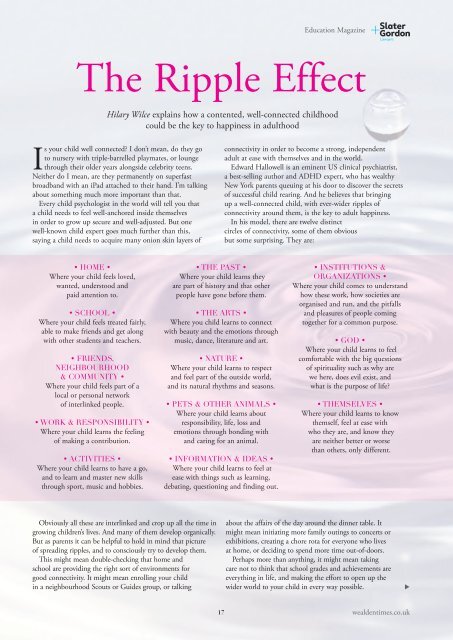You also want an ePaper? Increase the reach of your titles
YUMPU automatically turns print PDFs into web optimized ePapers that Google loves.
<strong>Education</strong> Magazine<br />
the ripple Effect<br />
Hilary Wilce explains how a contented, well-connected childhood<br />
could be the key to happiness in adulthood<br />
is your child well connected? i don’t mean, do they go<br />
to nursery with triple-barrelled playmates, or lounge<br />
through their older years alongside celebrity teens.<br />
neither do i mean, are they permanently on superfast<br />
broadband with an ipad attached to their hand. i’m talking<br />
about something much more important than that.<br />
Every child psychologist in the world will tell you that<br />
a child needs to feel well-anchored inside themselves<br />
in order to grow up secure and well-adjusted. but one<br />
well-known child expert goes much further than this,<br />
saying a child needs to acquire many onion skin layers of<br />
connectivity in order to become a strong, independent<br />
adult at ease with themselves and in the world.<br />
Edward hallowell is an eminent us clinical psychiatrist,<br />
a best-selling author and adhd expert, who has wealthy<br />
new york parents queuing at his door to discover the secrets<br />
of successful child rearing. and he believes that bringing<br />
up a well-connected child, with ever-wider ripples of<br />
connectivity around them, is the key to adult happiness.<br />
in his model, there are twelve distinct<br />
circles of connectivity, some of them obvious<br />
but some surprising. they are:<br />
• HOME •<br />
where your child feels loved,<br />
wanted, understood and<br />
paid attention to.<br />
• SCHOOL •<br />
where your child feels treated fairly,<br />
able to make friends and get along<br />
with other students and teachers.<br />
• FRIENDS,<br />
NEIGHBOURHOOD<br />
& COMMUNITY •<br />
where your child feels part of a<br />
local or personal network<br />
of interlinked people.<br />
• WORK & RESPONSIBILITY •<br />
where your child learns the feeling<br />
of making a contribution.<br />
• ACTIVITIES •<br />
where your child learns to have a go,<br />
and to learn and master new skills<br />
through sport, music and hobbies.<br />
• THE PAST •<br />
where your child learns they<br />
are part of history and that other<br />
people have gone before them.<br />
• THE ARTS •<br />
where you child learns to connect<br />
with beauty and the emotions through<br />
music, dance, literature and art.<br />
• NATURE •<br />
where your child learns to respect<br />
and feel part of the outside world,<br />
and its natural rhythms and seasons.<br />
• PETS & OTHER ANIMALS •<br />
where your child learns about<br />
responsibility, life, loss and<br />
emotions through bonding with<br />
and caring for an animal.<br />
• INFORMATION & IDEAS •<br />
where your child learns to feel at<br />
ease with things such as learning,<br />
debating, questioning and finding out.<br />
• INSTITUTIONS &<br />
ORGANIZATIONS •<br />
where your child comes to understand<br />
how these work, how societies are<br />
organised and run, and the pitfalls<br />
and pleasures of people coming<br />
together for a common purpose.<br />
• GOD •<br />
where your child learns to feel<br />
comfortable with the big questions<br />
of spirituality such as why are<br />
we here, does evil exist, and<br />
what is the purpose of life?<br />
• THEMSELVES •<br />
where your child learns to know<br />
themself, feel at ease with<br />
who they are, and know they<br />
are neither better or worse<br />
than others, only different.<br />
obviously all these are interlinked and crop up all the time in<br />
growing children’s lives. and many of them develop organically.<br />
but as parents it can be helpful to hold in mind that picture<br />
of spreading ripples, and to consciously try to develop them.<br />
this might mean double-checking that home and<br />
school are providing the right sort of environments for<br />
good connectivity. it might mean enrolling your child<br />
in a neighbourhood scouts or guides group, or talking<br />
about the affairs of the day around the dinner table. it<br />
might mean initiating more family outings to concerts or<br />
exhibitions, creating a chore rota for everyone who lives<br />
at home, or deciding to spend more time out-of-doors.<br />
perhaps more than anything, it might mean taking<br />
care not to think that school grades and achievements are<br />
everything in life, and making the effort to open up the<br />
wider world to your child in every way possible.<br />
<br />
17 wealdentimes.co.uk


















